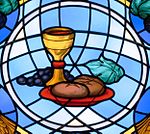The examples and perspective in this article may not represent a worldwide view of the subject. (December 2010) |
| Part of a series on the |
| Eucharist |
|---|
 |
Open communion is the practice of some Protestant Churches of allowing members and non-members to receive the Eucharist (also called Holy Communion or the Lord's Supper). Many but not all churches that practice open communion require that the person receiving communion be a baptized Christian, and other requirements may apply as well. In Methodism, open communion is referred to as the open table,[1][2] meaning that all may approach the Communion table.
Open communion is the opposite of closed communion, where the sacrament is reserved for members of the particular church or others with which it is in a relationship of full communion or fellowship, or has otherwise recognized for that purpose. Closed communion may refer to either a particular denomination or an individual congregation serving Communion only to its own members.
- ^ Holy Communion in the Methodist Church (PDF) (Report). Methodist Church in Britain. 2003. pp. 20, 28. Retrieved 9 September 2017.
- ^ "An open table: How United Methodists understand communion – The United Methodist Church". United Methodist Church. Retrieved 9 September 2017.